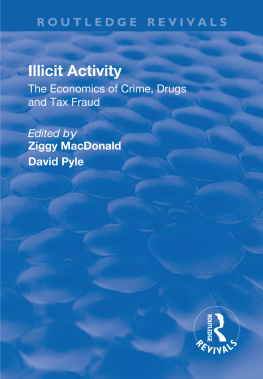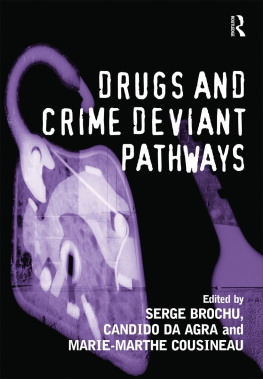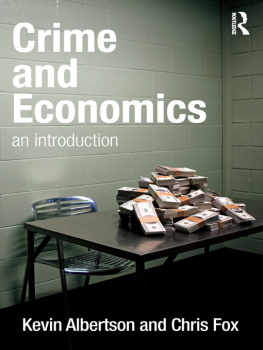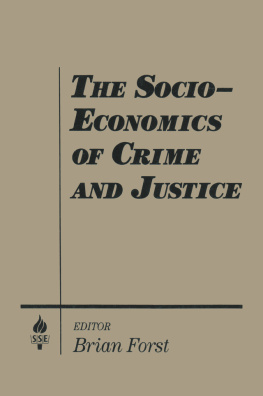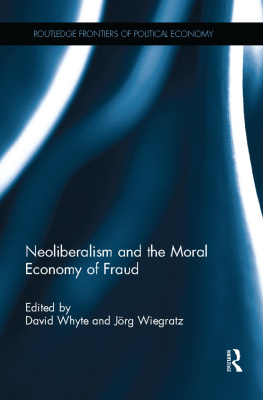ILLICIT ACTIVITY
For Lynsey, Angus, Su and Angus
Illicit Activity
The economics of crime, drugs and tax fraud
Edited by
Ziggy MacDonald
David Pyle
Public Sector Economics Research Centre,
University of Leicester
First published 2000 by Dartmouth Publishing Company and Ashgate Publishing
Reissued 2018 by Routledge
2 Park Square, Milton Park, Abingdon, Oxon OX14 4RN
711 Third Avenue, New York, NY 10017, USA
Routledge is an imprint of the Taylor & Francis Group, an informa business
Copyright Ziggy MacDonald and David Pyle 2000
All rights reserved. No part of this book may be reprinted or reproduced or utilised in any form or by any electronic, mechanical, or other means, now known or hereafter invented, including photocopying and recording, or in any information storage or retrieval system, without permission in writing from the publishers.
Notice:
Product or corporate names may be trademarks or registered trademarks, and are used only for identification and explanation without intent to infringe.
Publisher's Note
The publisher has gone to great lengths to ensure the quality of this reprint but points out that some imperfections in the original copies may be apparent.
Disclaimer
The publisher has made every effort to trace copyright holders and welcomes correspondence from those they have been unable to contact.
A Library of Congress record exists under LC control number: 00044165
ISBN 13: 978-1-138-73772-3 (hbk)
ISBN 13: 978-1-315-18519-4 (ebk)
Ali al-Nowaihi Lecturer, Department of Economics, University of Leicester, UK.
Derek Deadman Senior Lecturer, Department of Economics, University of Leicester, UK.
Amor Diez-Ticio Lecturer, Department of Applied Economics, University of Zaragoza, Spain and Visiting Fellow at the Public Sector Economics Research Centre, University of Leicester, UK.
Ingolf Dittmann Research Assistant, Department of Economics, University of Dortmund, Germany and Visiting Fellow at the Public Sector Economics Research Centre at the University of Leicester, UK.
Ziggy MacDonald Lecturer, Department of Economics, University of Leicester, UK.
Denise Osborn Professor of Econometrics, University of Manchester, UK and Visiting Fellow at the Public Sector Economics Research Centre, University of Leicester, UK.
Stephen Pudney Tyler Professor in the Department of Economics and Director of the Public Sector Economics Research Centre, University of Leicester, UK.
David Pyle Professor of Applied Economics in the Department of Economics, University of Leicester, UK.
Tolga Saruc Ph.D student in the Department of Economics, University of Leicester, UK.
ZIGGY MACDONALD AND DAVID PYLE
Overview
This book contains a collection of research papers on the theme of illicit activity, all written by either members or associate members of the Public Sector Economics Research Centre in the Department of Economics at the University of Leicester. The Oxford English Dictionary defines 'Illicit' as anything which is 'unlawful; not allowed'. The work that is reported in this volume covers three broad areas of such activity, namely crime (especially property related crime), consumption of illegal substances (drugs) and income tax evasion.
Crime and drug taking, especially, are regarded as major social issues in many advanced societies. For example, the UK Prime Minister (Tony Blair) in announcing the Government's ten-year strategy on drugs in 1998 said that, life in Britain 'could be so much better if we could break once and for all the vicious cycle of drugs and crime which wrecks lives and threatens communities' (Home Office, 1998, p. 1). The Strategy Document went on to say, 'drugs are a very serious problem in the UK...(they) are now more widely available than ever before and children are increasingly exposed to them. Drugs are a threat to health, a threat on the streets and a serious threat to communities because of drug-related crime' (ibid, p. 2). In the US, President Clinton announced, in 1998, a strategy to cut the use of illegal drugs by 50 per cent by 2007. This followed a report from the National Institute of Health showing that in 1996 over 40 per cent of High School Seniors had used drugs in the last year. In the UK, the British Crime Survey 1998 showed that 31 per cent of 16-19 year olds had used drugs in the last year.
Concern about crime is widespread throughout the Western World. The 1996 International Crime Victimisation Survey (Mayhew and van Dijk, 1997) shows that in eleven OECD countries, on average 22 per cent of respondents felt unsafe when out alone after dark. In England and Wales, the proportion was as high as one-third. However, the good news is that fear of crime has fallen in Britain during the 1990s, as the crime rate has come down (British Crime Survey, 1998). The same survey shows that in eight of the 11 OECD countries included in the sample, the crime victimisation rate was at least 24 per cent in 1995, with The Netherlands and England heading the league table with victimisation rates of 31 per cent. Despite this, in several countries (US, Canada and England and Wales, for example) rates of recorded crime have been falling since the early 1990s. Nevertheless, rates of recorded crime are still high by historical standards and the reasons for the decline in recent years are not entirely clear (but see Chapters Two through Six below).
For obvious reasons, the extent of income tax evasion cannot be known with any degree of certainty. However, various ingenious devices have been used by economists in order to try to measure it (see Pyle, 1989 for a survey) and it is common to see estimates of 'hidden' economic activity amounting to between ten and 15 per cent of Gross Domestic Product in a whole range of countries. This might be thought to have a number of economic consequences, the most obvious of which is the loss of tax revenue for the Government. In fact, loss of tax revenue is not obvious, provided tax evaders buy goods and services from others, which will generate income for the providers and tax receipts for the Government. However, tax evasion will certainly distort macroeconomic indicators such as unemployment statistics and measures of national income and output. Such distortions may cause governments to make totally inappropriate macroeconomic interventions. Also, tax evasion may distort resource allocation, if the opportunities to evade are greater in certain occupations than others. This may lead some individuals to choose an occupation that is in their own financial interest, but not in the best interests of society (for example, university professors may prefer to become self-employed odd job people, if by doing so they can avoid paying a great deal of income tax).
In response to evidence of increasingly widespread engagement in illicit activity by members of the general public, governments have been increasing their expenditure on policing, prisons, courts, and law enforcement generally. This represents a social waste, for the resources used in this way could be used for more productive purposes. For example, in the UK, expenditure on the criminal justice system increased in real terms from 8.6 billion in 1988-9 to 11.3 billion in 1997-8, i.e. by about 30 per cent over nine years (Social Trends, 1999).


